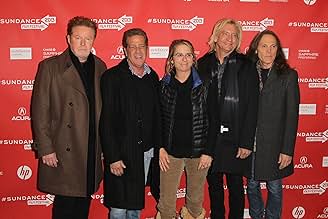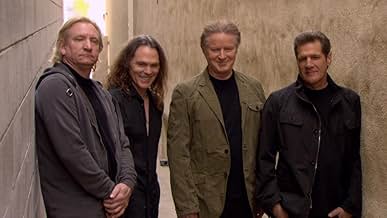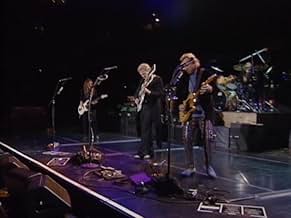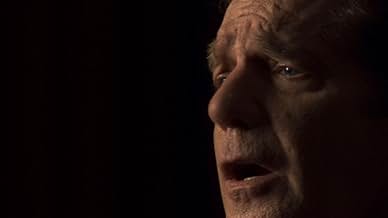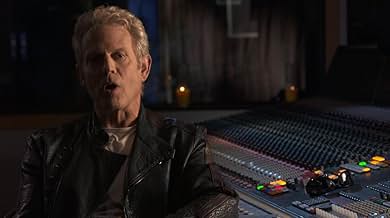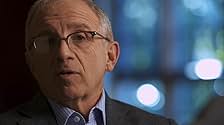AVALIAÇÃO DA IMDb
8,2/10
2,9 mil
SUA AVALIAÇÃO
Adicionar um enredo no seu idiomaThe life and times of the super successful American soft-rock band, Eagles.The life and times of the super successful American soft-rock band, Eagles.The life and times of the super successful American soft-rock band, Eagles.
- Ganhou 1 Primetime Emmy
- 3 vitórias e 1 indicação no total
Explorar episódios
Avaliações em destaque
I saw the Eagles in concert back in the summer of 77 (Linda Ronstadt opened!) at KC's Arrowhead Stadium, when the Eagles were at their peak, shortly after "Hotel California" had been released. Fast forward about 4 years, early fall 1981, I was hung-over in the afternoon after having celebrated my bachelor party the previous evening. I would be getting married in about 5 hours and was scared shitless. So I popped a beer, lit up a joint, threw a steak on the grill and listened to the HC album as it was the perfect background music for my brain as I tried to get a perspective on where I had been and where I was going. (BTW, still married to my love) The Eagles and their music were the perfect soundtrack for my life during the 70's when my priorities were girls, booze, recreational drugs, girls, bars, music, cars and girls.
So I was and remain a huge fan, although not interested in paying $200 plus for decent tickets to see them in concert (I might have paid $10 in 1977) and I've viewed the SHO doc about 4 times, recently for the first time since Frey's passing. I assume virtually everyone reading this page has also viewed it, so all can do is offer a few thoughts on a solid documentary about a what was a truly great band.
As is with most of these type of documentary's, the most interesting part are the early years, when the Eagles formed a group after being sidemen for various bands in the LA music scene of the late 60's and early 70's. Henley made an excellent observation about making it big but realizing that there were other musicians and writers, just as talented, but for one reason or another didn't get the big career break. Sometimes it's just being in the right place at the right time and for the Eagles, the wave broke just perfectly. After hitting the band hit superstardom with HC, Henley and Frey would align to take creative control of the group, which would ultimately cause the departure of two of the other originals, guitarist Bernie Leadon and bassist Randy Meisner. Lead guitarist Don Felder joined the band on album #3 "On the Border" (my personal favorite) and kicked the band up a notch with his blistering work, plus wrote the music for tune "Hotel California" (Henley & Frey try to minimize his contribution.) And it seems after HC everything pretty much went into the shitter as far as their relationships with one another as greed, arrogance and drugs devoured the band.
Some nice reflections by Joe Walsh, who was already a big name in rock when he joined the group for HC, replacing Leadon. Walsh almost killed himself through years of drug and alcohol abuse. He was able to clean himself up when the group reunited in 94 after 13 years and was able to tolerate the arrogance of Henley and Frey. Felder wasn't willing and ultimately would be fired by Henley, Frey and their manager Irving Azoff, the consigliere of the band. In retrospect Felder may have made the mistake that many make, overvaluing their contribution and importance to their organization. He did file a lawsuit for breach of contract that was settled by both parties and wrote a book about his experience that ultimately left him persona non grata to Henley and Frey and not in consideration for any further work with the band.
To this day the Eagles are still touring, with only Henley left from the original lineup. More power to them,but maybe we would be best left with just our memories of perhaps the most outstanding band of the greatest era in rock.
So I was and remain a huge fan, although not interested in paying $200 plus for decent tickets to see them in concert (I might have paid $10 in 1977) and I've viewed the SHO doc about 4 times, recently for the first time since Frey's passing. I assume virtually everyone reading this page has also viewed it, so all can do is offer a few thoughts on a solid documentary about a what was a truly great band.
As is with most of these type of documentary's, the most interesting part are the early years, when the Eagles formed a group after being sidemen for various bands in the LA music scene of the late 60's and early 70's. Henley made an excellent observation about making it big but realizing that there were other musicians and writers, just as talented, but for one reason or another didn't get the big career break. Sometimes it's just being in the right place at the right time and for the Eagles, the wave broke just perfectly. After hitting the band hit superstardom with HC, Henley and Frey would align to take creative control of the group, which would ultimately cause the departure of two of the other originals, guitarist Bernie Leadon and bassist Randy Meisner. Lead guitarist Don Felder joined the band on album #3 "On the Border" (my personal favorite) and kicked the band up a notch with his blistering work, plus wrote the music for tune "Hotel California" (Henley & Frey try to minimize his contribution.) And it seems after HC everything pretty much went into the shitter as far as their relationships with one another as greed, arrogance and drugs devoured the band.
Some nice reflections by Joe Walsh, who was already a big name in rock when he joined the group for HC, replacing Leadon. Walsh almost killed himself through years of drug and alcohol abuse. He was able to clean himself up when the group reunited in 94 after 13 years and was able to tolerate the arrogance of Henley and Frey. Felder wasn't willing and ultimately would be fired by Henley, Frey and their manager Irving Azoff, the consigliere of the band. In retrospect Felder may have made the mistake that many make, overvaluing their contribution and importance to their organization. He did file a lawsuit for breach of contract that was settled by both parties and wrote a book about his experience that ultimately left him persona non grata to Henley and Frey and not in consideration for any further work with the band.
To this day the Eagles are still touring, with only Henley left from the original lineup. More power to them,but maybe we would be best left with just our memories of perhaps the most outstanding band of the greatest era in rock.
And this was an authorized bio. Wow.
Though I've loved The Eagles music, there was something I never liked about the band. So I decided to learn and find out more about the guys now that I have time. I always wanted to watch their documentary, and started to like them at the beginning of the movie. But boy did that change about halfway through. Now I think I had good intuition. Henley and Frey were total unlikable a-ho___s. My gosh.
Though I've loved The Eagles music, there was something I never liked about the band. So I decided to learn and find out more about the guys now that I have time. I always wanted to watch their documentary, and started to like them at the beginning of the movie. But boy did that change about halfway through. Now I think I had good intuition. Henley and Frey were total unlikable a-ho___s. My gosh.
Aside from a few moments that made we want to cringe (such as Glenn Frey's comments about Don Felder being fired during their reunion of the 1990s), this is a very enjoyable and thorough documentary about the Eagles. Not surprisingly, it focuses mostly on Frey and Don Henley-- the pair that wrote most of the songs, sang most of the songs and created the group. It follows the pair from their early pre-band days and ends around 2000. Through the course of the film, there are tons of interviews, lots of odd tidbits and a very comprehensive history of the group. For practically everyone except someone hating The Eagles (who would that be?!), a very well made and as complete a picture of the group as you can find.
One might think that should there ever be a Mount Rushmore of country rock, they may well etch the faces of the Eagles into the cliff side. However, they might need some time, for there have been quite a few comings and goings and line-up changes in camp Eagles over the years. This documentary ventures into the first chapter of the band's existence and provides evidence of the rifts, drifts, differences and fallouts that have occurred. It is probably fair to say that the Eagles are one of the most notoriously disharmonious of bands, who inexplicably and ironically orchestrate some of the most harmonious musical harmonies of any group since CSN. It is still a struggle today to meet a band that matches up vocally.
Although they may not straddle the earth with an omnipresence that marked their original inception and 1970s heyday, the reformed country rockers are still synonymous with classic radio and the rock album format.
Running at 2 hours, there is a lot of ground to cover. For a casual viewer, there is a mercifully breezy skip through respective childhoods and the pace is pushed with momentum towards the inspiring and prolific late-60s underground music scene of LA that homed residencies of Poco, Buffalo Springfield, Joni Mitchell, Jackson Browne, Linda Ronstadt et al. There is acknowledgment as to the creatively incestuous backdrop of the times, of the area and of the era. The sort that enabled artists to shift, move and collaborate seemingly at will. As the late 60s moved into the early 70s and success increased for the bulk of the aforementioned artists, it is clear that all look back with giddy rose-tinted glasses of nostalgia. The creativity was clearly as intoxicating as the drugs that they were recreationally self-medicating.
The Eagles were always a band that stood apart from their peers. They did so for a few reasons. One, is that they were massively successful in a way that the others could only dream of, another is that they had a steely core that made them efficiently consummate and business-like. Both of these aspects are highlighted by the documentary. The band reflect openly upon their motivations and inclinations, with a mix of new interviews and footage that dates back to the period. To see how much and how little they've changed is part of the joy of the feature. Around the mid-point, Joe Walsh arrives into the frame and is spotlighted in both the past and the present as an impassioned guitarist who is part-talent, part-court jester. His phrasing exudes a humorous hybrid of Keith Richards and Stephen Stills along with a healthy dose of his own breezy personality. For a music film, the tone is more or less consistently serious throughout, so his appearance offers some light hearted respite.
On the downside, there is not as much insight into the studio processes as a fan may want, but the band members are all given a fair hearing from both time periods and talk candidly about being in the epicentre of the Eagles whirlwind.
Understandably, Part One ends on a decisively sour note; their downfall and break-up. Although the pressures of topping the totemic Hotel California engulfed them all to a certain extent, it is clear that decisive fractures of the intragroup relationships had crippled the band. It is also evident that the distractions around the process was a demon that gobbled them up. Power may corrupt and absolute power may corrupt absolutely, but I am sure there is a pithy equivalent for success. Life in the fast lane had brought this group crashing into a ditch.
This is a tale that has enough acrimony to give Pink Floyd a run for their money. They may have been back together since 1994, as they will happily testify, but in case you're wondering, they only speak to Don Felder through lawyers. Some things don't change and won't be taken easy.
Although they may not straddle the earth with an omnipresence that marked their original inception and 1970s heyday, the reformed country rockers are still synonymous with classic radio and the rock album format.
Running at 2 hours, there is a lot of ground to cover. For a casual viewer, there is a mercifully breezy skip through respective childhoods and the pace is pushed with momentum towards the inspiring and prolific late-60s underground music scene of LA that homed residencies of Poco, Buffalo Springfield, Joni Mitchell, Jackson Browne, Linda Ronstadt et al. There is acknowledgment as to the creatively incestuous backdrop of the times, of the area and of the era. The sort that enabled artists to shift, move and collaborate seemingly at will. As the late 60s moved into the early 70s and success increased for the bulk of the aforementioned artists, it is clear that all look back with giddy rose-tinted glasses of nostalgia. The creativity was clearly as intoxicating as the drugs that they were recreationally self-medicating.
The Eagles were always a band that stood apart from their peers. They did so for a few reasons. One, is that they were massively successful in a way that the others could only dream of, another is that they had a steely core that made them efficiently consummate and business-like. Both of these aspects are highlighted by the documentary. The band reflect openly upon their motivations and inclinations, with a mix of new interviews and footage that dates back to the period. To see how much and how little they've changed is part of the joy of the feature. Around the mid-point, Joe Walsh arrives into the frame and is spotlighted in both the past and the present as an impassioned guitarist who is part-talent, part-court jester. His phrasing exudes a humorous hybrid of Keith Richards and Stephen Stills along with a healthy dose of his own breezy personality. For a music film, the tone is more or less consistently serious throughout, so his appearance offers some light hearted respite.
On the downside, there is not as much insight into the studio processes as a fan may want, but the band members are all given a fair hearing from both time periods and talk candidly about being in the epicentre of the Eagles whirlwind.
Understandably, Part One ends on a decisively sour note; their downfall and break-up. Although the pressures of topping the totemic Hotel California engulfed them all to a certain extent, it is clear that decisive fractures of the intragroup relationships had crippled the band. It is also evident that the distractions around the process was a demon that gobbled them up. Power may corrupt and absolute power may corrupt absolutely, but I am sure there is a pithy equivalent for success. Life in the fast lane had brought this group crashing into a ditch.
This is a tale that has enough acrimony to give Pink Floyd a run for their money. They may have been back together since 1994, as they will happily testify, but in case you're wondering, they only speak to Don Felder through lawyers. Some things don't change and won't be taken easy.
9tavm
It wasn't until Glenn Frey died that I discovered that he and the rest of the band members-past and present-did this documentary in two parts a few years ago. So I ordered both discs from Netflix. The first part covered the Eagles' heyday in the '70s with many of their hits accounted for like their first one-"Take It Easy" which is always my favorite of theirs-or "Take It to the Limit" which Frey mistakenly ID's as the group's first No. 1 single. (It was actually "Best of My Love" which, strangely, was one of the few hits not showcased in the film. "TITTL" actually went to No. 4.) In both parts, the emphasis is on Frey and Don Henley since they wrote most of the songs, were in the band for both runs, and had successful solo careers in between. Other current members Joe Walsh and Timothy B. Schmit also frequently comment alongside former members Bernie Leadon who recently returned to the fold, Randy Meisner, and Don Felder. While I'll always admire Frey as a songwriter and artist, I can't help but think that he's the main reason some members left. I'd like to think they've all made peace with him before he passed. Certainly, I was very glad when Don H., Bernie, Joe, and Tim appeared on the Grammys several weeks ago in tribute to Glenn and performed "Take It Easy" with Jackson Browne-who co-wrote the song some 44 years ago-singing lead even though Browne forgot some of the lyrics. Anyway, I highly enjoyed History of the Eagles so that's a high recommendation.
Você sabia?
- CuriosidadesThe documentary includes interviews from all seven members of the band through the decades
- Erros de gravaçãoGlenn Frey claims that "Take It To The Limit" was the Eagle's first number one record. In fact their first number one record was "Best of My Love" released over a year before.
- ConexõesFeatured in 2013 Primetime Creative Arts Emmy Awards (2013)
Principais escolhas
Faça login para avaliar e ver a lista de recomendações personalizadas
- How many seasons does History of the Eagles have?Fornecido pela Alexa
Detalhes
- Tempo de duração1 hora 34 minutos
- Cor
Contribua para esta página
Sugerir uma alteração ou adicionar conteúdo ausente


